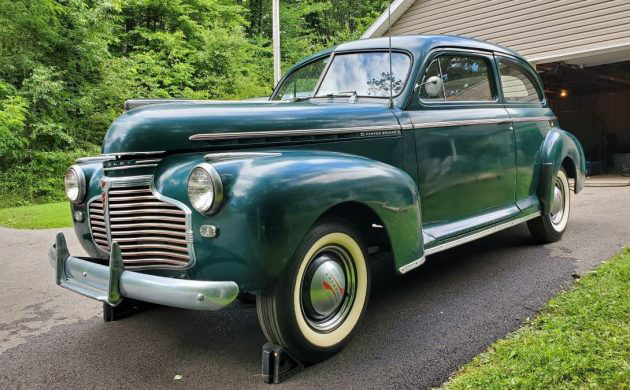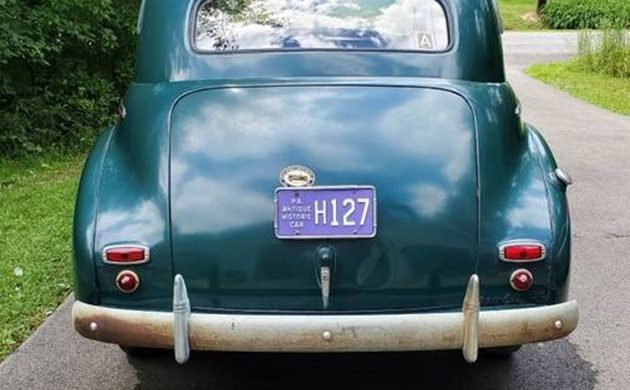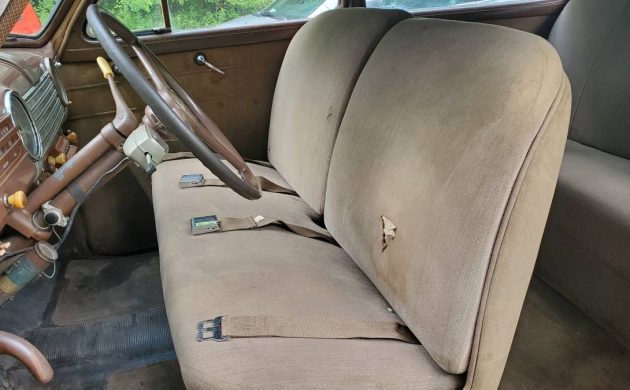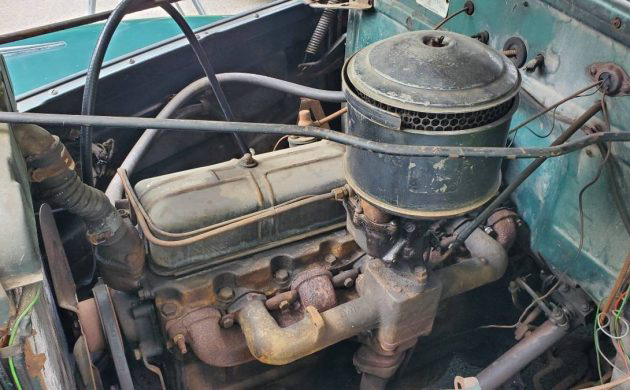From 1933 and 1942, the Master and Master Deluxe were the “bread and butter” cars of Chevrolet. They were joined later in the run by the Special Deluxe as a fancier family automobile. The war effort that began in 1942 spelled the end for the Master Series, which had been hugely popular as people’s finances recovered after The Great Depression. The seller’s Master Deluxe 2-door sedan has been in the same family for 68 years. Off the road since 1991, it does run and drive but needs mechanical and cosmetic attention.
Other than trim and bright work there weren’t many physical differences between the Master and Master Deluxe. Both used a 216 cubic inch inline-6 (85 hp), but the Master Deluxe had an independent front suspension while the Master stuck with a beam front axle and leaf springs. That meant the ride of the Master Deluxe should have been better. A “3-on-the-tree” manual transmission continued to be standard fare as an automatic tranny was still years away.
The seller’s car sounds like a family member, having been in the fold since around 1956. 125,000 miles have been added to the odometer, but that was before 1991 when the car was taken off the road and may have been in a barn. It looks rather clean now, though there is some rust in a few places and the interior is rather tired (wouldn’t you be after 83 years?). Everything is original, though we wonder about the green paint.
To make the car roadworthy, new brakes, tires, and more will be needed. The seller is throwing in a pile of parts said to be worth $2,500 though we only see a few boxes. That includes trim pieces, too, if needed. Located in Butler, Pennsylvania, this pre-war classic is available here on craigslist for $9,500. You don’t see many like this anymore! BTW, thanks to “Zappenduster” for the cool tip!






OOOPs…the ad says $9500..
Oops is right. My bad. Corrected. Thanks!
Very nice for what you’re getting. The
brakes on these are pretty much
straightforward except for the access to the master cylinder which is under
the driver’s side floorboard and is a
real pain in the ass to get to when you
need to service or change it. The 216
shouldn’t be all that hard to revive but
you might have to hand choke it to draw gas from either the tank or a
Jerry can. And you might wanna clean the sediment bowl on the carb
and add an inline filter to make sure
you’ve got clean fuel going up to it.
An Emory board should clean the points, plugs, and the leads inside the
distributor to insure you’re got spark.
Me, I’d go with a 12 volt system to take advantage of brighter lights for
driving at night and to bypass the
need to polarize the generator and
the voltage regulator so I don’t get
knocked on my ass while doing that
task. Been there, did that, no fun at
all! And other than changing all four tires and tubes, that’s all you’ll need
to drive and enjoy this great old car.
And no, it doesn’t need a screaming LS swap either!
IMHO 1940 is a sweet spot for styling for each of the big three. The years just before and after are almost equals, incl. this ’41.
The downside to this “Stovebolt” engine is the splash lubrication system. Go to the 235 ci version of this engine (1953 and later) and you get pressurized lubrication, a significant improvement.
Identification is easy. If the valve cover is held on by bolts through its top it’s an early version. The more normal peripheral bolts indicate pressurized oiling.
Yeah, I’m a fan of the 235. And with a readily available adapter plate a T-5 transmission bolts right up, allowing (with the proper rear end gearing) freeway speeds.
Nice one, if not too rusty good price too. If you must upgrade I agree with Mr Carmichael’ s plan.